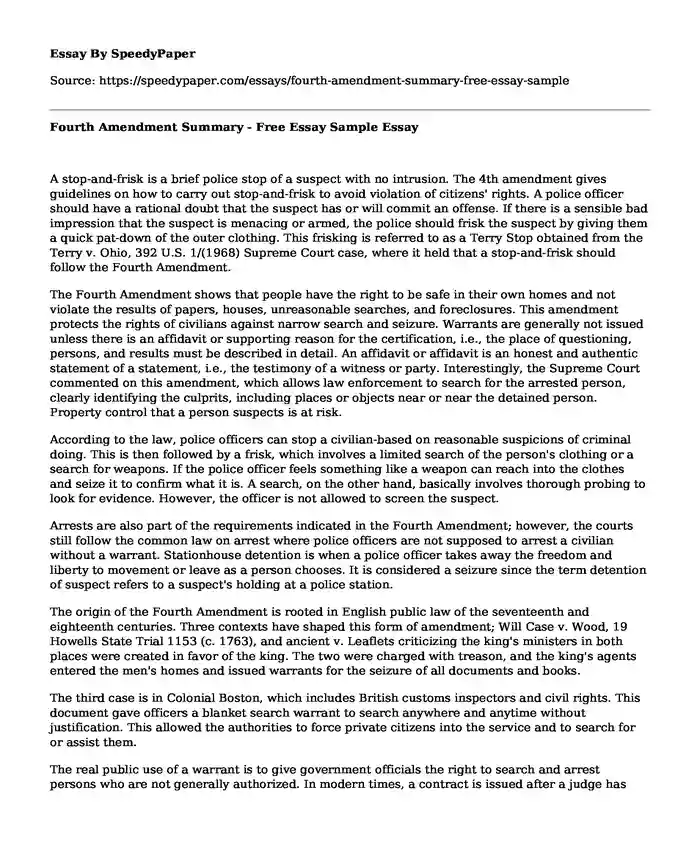
| Essay type: | Analytical essays |
| Categories: | Analysis Law Court system |
| Pages: | 3 |
| Wordcount: | 612 words |
A stop-and-frisk is a brief police stop of a suspect with no intrusion. The 4th amendment gives guidelines on how to carry out stop-and-frisk to avoid violation of citizens' rights. A police officer should have a rational doubt that the suspect has or will commit an offense. If there is a sensible bad impression that the suspect is menacing or armed, the police should frisk the suspect by giving them a quick pat-down of the outer clothing. This frisking is referred to as a Terry Stop obtained from the Terry v. Ohio, 392 U.S. 1/(1968) Supreme Court case, where it held that a stop-and-frisk should follow the Fourth Amendment.
The Fourth Amendment shows that people have the right to be safe in their own homes and not violate the results of papers, houses, unreasonable searches, and foreclosures. This amendment protects the rights of civilians against narrow search and seizure. Warrants are generally not issued unless there is an affidavit or supporting reason for the certification, i.e., the place of questioning, persons, and results must be described in detail. An affidavit or affidavit is an honest and authentic statement of a statement, i.e., the testimony of a witness or party. Interestingly, the Supreme Court commented on this amendment, which allows law enforcement to search for the arrested person, clearly identifying the culprits, including places or objects near or near the detained person. Property control that a person suspects is at risk.
According to the law, police officers can stop a civilian-based on reasonable suspicions of criminal doing. This is then followed by a frisk, which involves a limited search of the person's clothing or a search for weapons. If the police officer feels something like a weapon can reach into the clothes and seize it to confirm what it is. A search, on the other hand, basically involves thorough probing to look for evidence. However, the officer is not allowed to screen the suspect.
Arrests are also part of the requirements indicated in the Fourth Amendment; however, the courts still follow the common law on arrest where police officers are not supposed to arrest a civilian without a warrant. Stationhouse detention is when a police officer takes away the freedom and liberty to movement or leave as a person chooses. It is considered a seizure since the term detention of suspect refers to a suspect's holding at a police station.
The origin of the Fourth Amendment is rooted in English public law of the seventeenth and eighteenth centuries. Three contexts have shaped this form of amendment; Will Case v. Wood, 19 Howells State Trial 1153 (c. 1763), and ancient v. Leaflets criticizing the king's ministers in both places were created in favor of the king. The two were charged with treason, and the king's agents entered the men's homes and issued warrants for the seizure of all documents and books.
The third case is in Colonial Boston, which includes British customs inspectors and civil rights. This document gave officers a blanket search warrant to search anywhere and anytime without justification. This allowed the authorities to force private citizens into the service and to search for or assist them.
The real public use of a warrant is to give government officials the right to search and arrest persons who are not generally authorized. In modern times, a contract is issued after a judge has reviewed a law enforcement application. A current warrant should show the search location, the items to be seized, the people, the justification, and possibly the cause and characteristics (search and seizure). The warrant was used to authorize the government in government law; it was developed to protect citizens and their loved ones.
Cite this page
Fourth Amendment Summary - Free Essay Sample. (2023, Dec 13). Retrieved from https://speedypaper.net/essays/fourth-amendment-summary-free-essay-sample
Request Removal
If you are the original author of this essay and no longer wish to have it published on the SpeedyPaper website, please click below to request its removal:
- Essay Example on Crime and Deviance
- Free Essay: How Would a Supporter of Natural Law View the Use of Torture?
- Should Drugs Be Legalized? Paper Example
- Essay Example: SWOT Analysis of Perth Tours
- Essay Example - Performance Appraisal
- Free Essay Example on Psychosocial Problems
- Cultural Critiques in Human Beings - Free Essay Example
Popular categories




